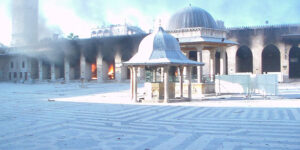Syrian President Bashar Assad ordered on Monday immediate repairs to a historic mosque in the city of Aleppo after fierce fighting between opposition and regime forces set parts of the compound on fire over the weekend.
 Government troops had been holed up inside the 13th century Umayyad Mosque, a UNESCO World Heritage site, in downtown Aleppo for several months before the opposition fighting to topple Assad launched a push to liberate it this week.
Government troops had been holed up inside the 13th century Umayyad Mosque, a UNESCO World Heritage site, in downtown Aleppo for several months before the opposition fighting to topple Assad launched a push to liberate it this week.Activist Mohammad al-Hassan said the army had been using the mosque as a base because of its strategic location in the center of the old city of Aleppo. The opposition and activists have complained that soldiers and pro-government militiamen wrote offensive graffiti on its walls and drank alcohol inside.
But the regime and the opposition forces are now trading accusations over who is responsible for the fire at the mosque compound adjacent to Aleppo’s medieval citadel. Videos posted by activists online show a large fire and black smoke raging inside the mosque on Saturday, and later, its blackened, pockmarked walls. Debris is strewn on the floors where worshippers once prayed on green and gold carpeting.
“Assad’s thugs set the mosque on fire as a punishment for being defeated by the Free Syrian Army,” the caption on the video read, referring to the opposition fighting to topple Assad. The government on Monday said it pushed back the opposition from the mosque after the weekend fighting, though activists are giving conflicting reports on who controls it.
In another video, an opposition fighter inside the mosque holds up a torn copy of the Muslim holy book, or Quran, saying: “These are our Qurans, this is our religion, our history.”
The mosque is the latest victim of the violence plaguing Syria.
On Sept. 29, a fire caused by the fighting swept through Aleppo’s covered market, burning more than 500 shops in the narrow, vaulted passageways.
Some of the country’s most significant historical sites have been turned into bases for soldiers and the opposition, including historic citadels and Turkish bath houses.
In a possible effort to contain the fallout from the damage at the mosque, Assad issued a presidential decree to form a committee to repair the mosque by the end of 2013.
Aleppo has been the scene of intense fighting, particularly since the opposition launched a new offensive more than two weeks ago to try to dislodge regime troops. The fighting has devastated large areas of the city of 3 million, Syria’s former business capital.
Meanwhile, international mediator Lakhdar Brahimi has asked Iranian authorities for help in achieving a ceasefire in Syria during the Islamic holiday of Eid al-Adha later this month, his spokesman said on Monday.
Brahimi made the request in talks with Iranian leaders during a visit to Tehran, which has strongly supported Assad’s efforts to crush a 19-month-old uprising.
“Brahimi has appealed to the Iranian authorities to assist in achieving a ceasefire in Syria during the forthcoming Eid Al-Adha, one of the holiest holidays celebrated by the Muslims around the world,” his spokesman said, referring to the Islamic holiday which starts around Oct. 25 and lasts several days.
Brahimi also underlined that the crisis in Syria “was getting worse every day and stressed the urgent need to stop the bloodshed,” the spokesman said. A cease-fire would “help create an environment that would allow a political process to develop,” he quoted Brahimi as saying.
Kofi Annan, Brahimi’s predecessor, negotiated an April 12 cease-fire agreement which led to a slight dip in the violence for a few days but saw fighting steadily escalate in the ensuing weeks. Since April, clashes have spread to new areas of the country and more than 100 people are killed daily while Assad has used fighter jets and helicopters to crush the revolt.
(Today’s Zaman)













